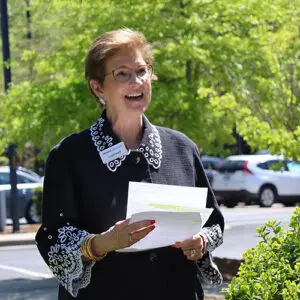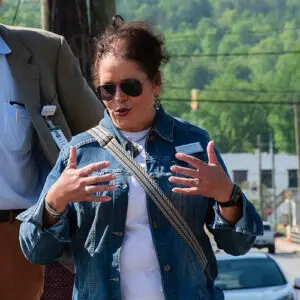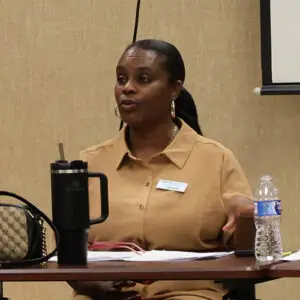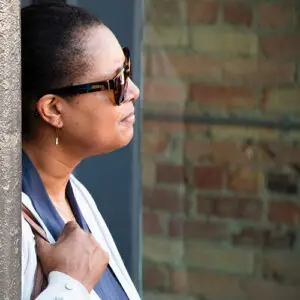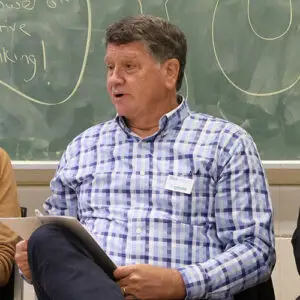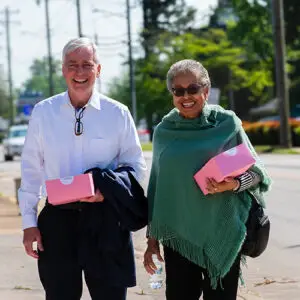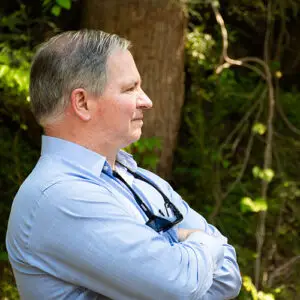From Our Leadership
Our Board Chair Jack Cecil (JC) and CEO Dr. Susan Mims (SM) recently reflected on Dogwood’s first five years as a foundation and Hurricane Helene response in 2024.
Q: Reflect on Dogwood’s first five years, which included a pandemic and a significant hurricane. What guided and continues to guide Dogwood, no matter what it faces?
JC: Our purpose and values haven’t changed, only the circumstances around us. When Dogwood began, we had a strong sense of resolve and what we wanted to accomplish. We are keenly focused on improving the lives of all the people of Western North Carolina (WNC). This incorporates their health and wellbeing, educational attainment, economic livelihood, housing and the opportunity to live in thriving and prosperous communities. These things are foundational to stabilizing and growing our region for future generations.
After listening to communities from across our 18-county region, we had formative conversations about our organizational purpose with board members on a bus trip to Raleigh in 2019. Their input guided us then and still directs us now. Unlike most private foundations, we weren’t endowed by one person or family with specific ideas of what to fund. Instead, we engaged people with deep knowledge of the community and envisioned together what WNC could become in 10, 20 or 30 years from now. We asked, “what are the opportunities?” and “how can we strategically invest in your community alongside you?” Those questions are as relevant in the midst of a pandemic or after a hurricane as they are every day.
SM: That’s right. Pandemics, storms, changes to public funding and whatever else is coming next will always impact our work. Challenges help us consider new ways for how we do our work together. Beyond our purpose and values, we also developed what we call our Community Investment Philosophy, which prioritizes being community-focused in all we do and viewing equity as a means and end to our work. These principles matter because of the ways people experience disinvestment and disconnection – whether they are in cities or in deep hollers of the region. Dogwood has an obligation and responsibility to use its resources to serve all people in our 18 counties and the Qualla Boundary, and we know that will not happen quickly, so we’re in this for the long haul.
Q: What does the 2024 theme of “Cultivating Active Hope” mean to you?
SM: In our Community Investment Philosophy, we say we need to be both impatient and patient. We are impatient for the change we want to see in the region but know that we must be patient because transformational change takes time. Active hope isn’t waiting for something to happen. It’s the practice of having a deep understanding of where we are starting and a vision for where we are heading, then taking steps toward that vision every day, even when things are difficult. At Dogwood, we work to cultivate active hope for WNC with the incredible leadership, wisdom and know-how of our community partners.
Q: Why is listening so important to Dogwood? How does community voice inform how you approach community investments?
SM: Listening with deep curiosity is the foundation in Dogwood’s approach. In fact, we started 2024 with 19 community listening sessions across WNC to inform our five-year strategy for 2025 to 2030. Nearly 350 community voices affirmed our purpose and helped define how we work. We heard that organizations needed dependable, longer-term funding for operations and developing their capacity. They wanted help connecting, learning and collaborating with other organizations. These insights formed the basis of our open grant opportunities in 2025 focused on Stronger Organizations and Collaboration & Innovation. It also helped us think about deep investments in issues critical for the region and what Dogwood could do to attract more capital from outside our area for our grantee partners. This ended up being opportune when Hurricane Helene hit the region.
JC: The capital attraction piece is larger than just money, too. At Dogwood, we refer to something called our “SMIRF” – which stands for social, moral, intellectual, relational and financial assets. After we listened to and learned of our community’s needs, we leveraged our collective connections, access to capital and intellectual knowledge across the state and country. We did this during COVID, and we were able to do it again now after Helene.
Q: A hurricane like Helene isn’t something a region or organization like Dogwood can fully plan for. Talk about the response those first days and weeks after the storm.
SM: In one word, it was tough. The loss of connectivity made it harder. When you are cut off like that, you ask immediate questions like “is my family ok?,” “how are my neighbors?,” “my colleagues?” After a few days, we realized how big this was and the responsibility Dogwood would hold in response. I am incredibly grateful to our board members who attended a virtual meeting within a week after the storm to review our initial relief funding. I was amazed that even with the connectivity challenges, every board member found a way to participate and approve the funding. I remember sitting in the dark with the sounds of helicopters and chainsaws all around, filled with emotion as our board responded and trusted our team to move resources quickly to where they were most needed.
JC: I was on a cell phone because internet was not available. I chaired the meeting completely by intuition, as I couldn’t read body language or see who raised their hand. We checked in on everybody and talked about what each of us were witnessing and feeling about our communities. And then we unanimously approved the first $30 million in relief. It was incredible when you think that it was basically 40% of our typical annual grantmaking, and no one even hesitated or second guessed it. And, then we added another $20 million and another $20 million. We were able to grant an additional $70+ million on top of our annual budgeted grantmaking and impact investments. Overall, we invested more than $200 million in 2024. We all thought how fortunate WNC is to have this resource to support our neighbors who were in dire need of assistance at this critical moment.
Q: What has Dogwood learned from its 2024 Hurricane Helene relief response so far?
SM: Relationships matter. One of the first things we did was to connect with trusted community partners and networks across the region. One of the first calls was to Elizabeth Brazas at The Community Foundation of Western North Carolina about how we could contribute additional dollars to their Emergency and Disaster Response Fund. Another call was with Jennifer Ferre from WNC Communities to ask “what are you seeing?” Their team was out checking on our local farmers to make sure they were ok and assess their needs. They helped get the food they had left to MANNA Food Bank and other food delivery organizations. They also leveraged their network of 73 community centers to distribute supplies.
Partners like Impact Health helped distribute food and supplies to people through their network of 60 human service organizations embedded in communities throughout the region. I remember how ABCCM stepped up to move supplies on a tractor to Mitchell County, a place that was hit so hard. Pisgah Legal began helping people navigate FEMA. Our safety net healthcare organizations (FQHCs) provided care to people in shelters or took buses to treat people where they were. Dogwood funds supported early childcare centers, so folks had safe places for their children as they worked or volunteered. Something as basic as helping grantee organizations continue to make payroll for their employees really mattered. Each relief grant moved resources to the organizations closest to the work on the ground. I still marvel at how our region came together to care for one another.
Q: Grants to small businesses were an unexpected part of Dogwood’s relief response. Talk about what went into that decision and what we learned.
JC: Dogwood recognizes what makes up the employment base of our region – it’s a collection of small businesses. With a storm like Helene, small businesses might only have business interruption insurance, if anything. If those small businesses close their doors, their employees lose their jobs. Our goal was to keep as many people employed as possible so that our community and economy could sustain itself and ultimately fully recover. One way we could help was by providing $25K to $50K grants – not loans – to small businesses. We knew that some small businesses were still repaying loans from COVID, so we needed to be more flexible. By creating the WNC Small Business Initiative with Appalachian Community Capital, we attracted an additional $25 million from The Duke Endowment and the State of North Carolina to pair with the $30 million we invested. That $55 million was granted to nearly 2,200 small businesses in four months. By using our SMIRF, thinking creatively and building an infrastructure for this initiative, we were able to keep more small businesses open and many people gainfully employed.
Q: WNC is home to you both. How has the storm influenced the way you want to lead in the region? How Dogwood will lead in the region?
SM: Any adversity leads to reflection. At Dogwood, we always come back to listening with curiosity to learn from our community and those with experience and success. Pulling these together is key to building a better and stronger WNC. We talk a lot about our “post-Helene environment,” which really means that we acknowledge the challenges, think about how our region can come together, and capitalize on our many assets to move through the challenges. WNC has a history of working collaboratively and creatively toward solutions. This takes work. And I think that’s what the theme of this annual report is about. Cultivating active hope is a practice. You can’t expect that somebody else is going to come and make everything better. Each of us must practice that hope and perseverance by leaning into what we can do together every step of the way.
JC: For me, the storm crystalized the differences between relief, recovery and rebuilding. Leading relief efforts requires something quite different than recovery and rebuilding. In the relief stage, you’re moderating the emotional fluctuations of the ups and downs. You’re responding to what you hear and see in real time. But recovery and rebuilding require a more strategic thought process and offers the chance to re-envision and cultivate active hope to improve the lives of all people of WNC. By collaborating with our communities and partners, Dogwood is prepared to commit to the longer-term strategic work ahead.
Q: If you had to use just a few sentences to describe what you want partners to know about Dogwood’s approach in the future, what would it be?
JC: It’s in Dogwood’s DNA that we listen and support our neighbors. Together we need to be focused, creative, imaginative, flexible and forward-thinking so that we can improve the lives of our families and communities for generations to come.
SM: Listening to the community and developing relationships is essential to our work, whether it’s in a less challenging or a more challenging time. Connecting and collaborating are key for Dogwood. And when we stay true to who we are – including the people and communities who have not always had a voice – we will realize the outcomes in Western North Carolina that we wish to see.
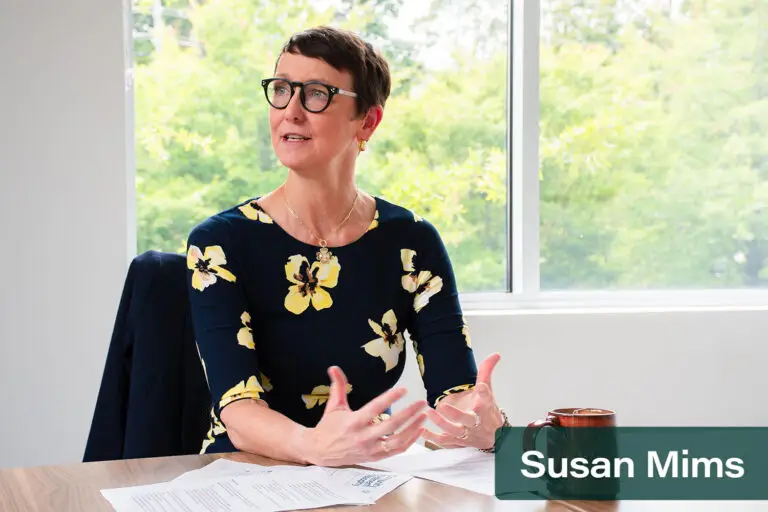
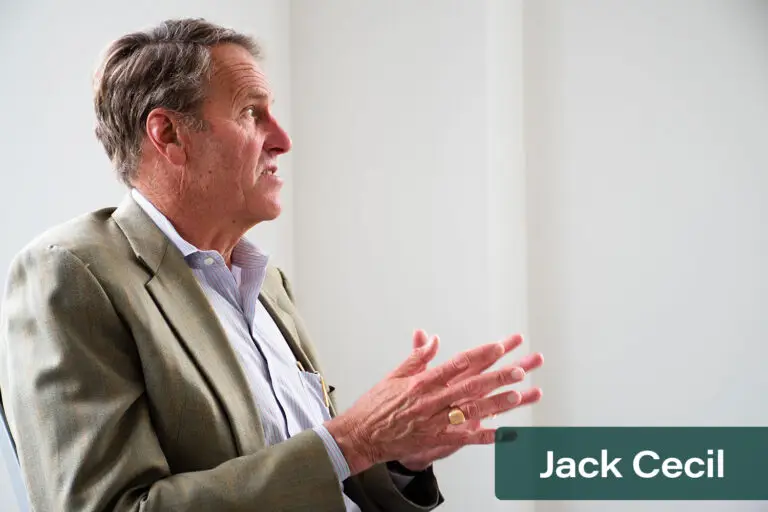
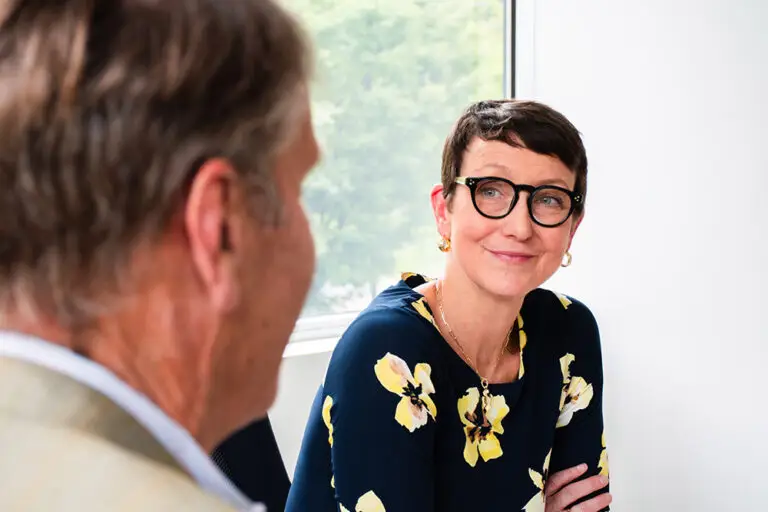

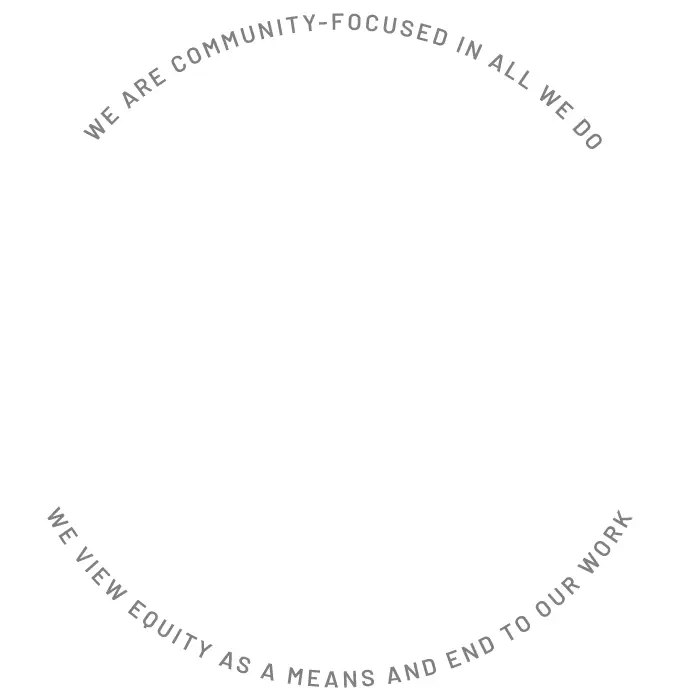
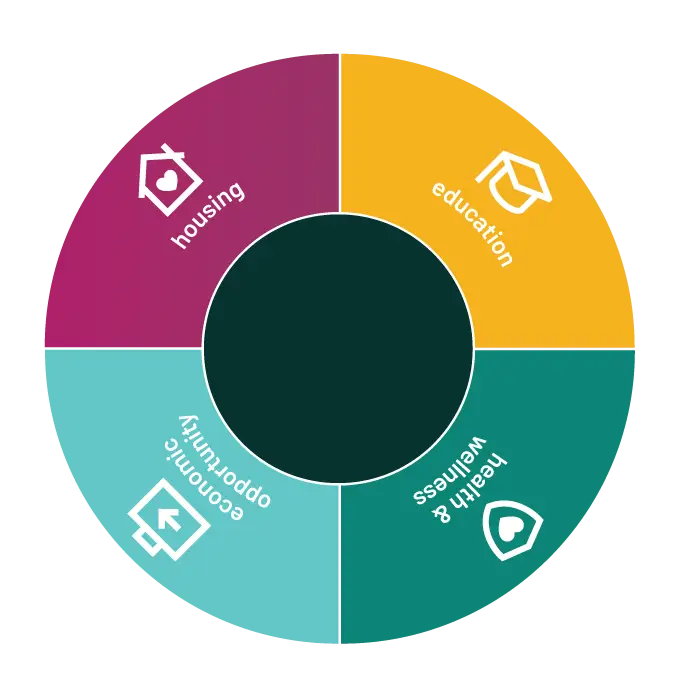
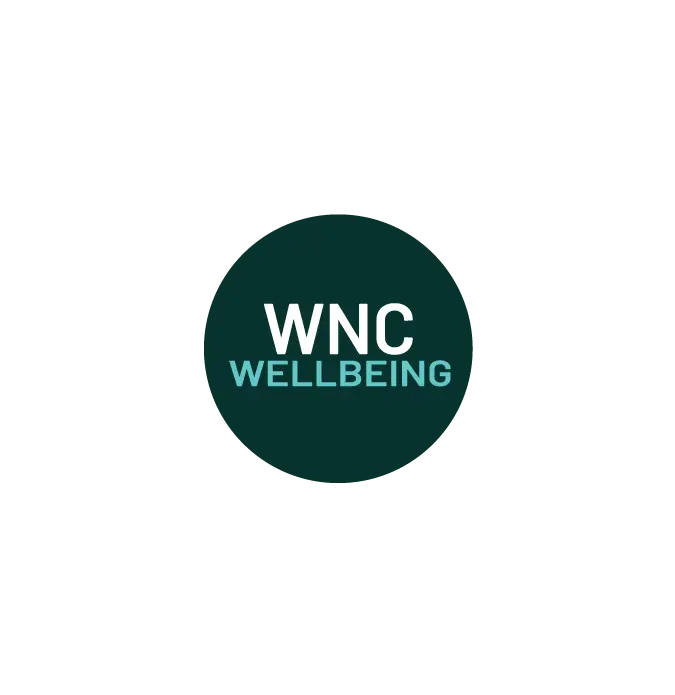
Our Priorities
The best ideas for dramatically improving the health and wellbeing of the region come from the people who live and work in our local communities.
Dogwood invests in aligned organizations that advance efforts in our four interconnected strategic priorities of housing, education, economic opportunity, and health & wellness.
Our Community Investment Philosophy shapes our approach to our work through two anchoring principles: we are community-focused in all we do, and we view equity as a means and an end for our work.
Our commitment to these foundational principles fuels our efforts to make the place we call home healthier, stronger, more inclusive, better educated, economically stable and more resilient today and for future generations.
By the Numbers
In 2024, Dogwood approved $151 million in 632 new grant commitments, including $70+ million for Hurricane Helene relief and recovery, some of which will be paid in future years. More than $147 million was distributed through 547 grants, some of which were approved in previous years.
2024 Grantmaking by Strategic Priority
| Strategic Priority | Grants Paid | New Grant Commitments |
|---|---|---|
| Housing | $18,823,195 | $20,584,550 |
| Education | $14,802,787 | $7,948,121 |
| Economic Opportunity | $11,198,823 | $14,961,133 |
| Health & Wellness | $22,788,230 | $21,203,640 |
| Emerging Strategies | $9,020,333 | $11,307,504 |
| Helene Relief | $70,519,700 | $75,014,700 |
| Total | 147,153,068 | 151,019,648 |
Total Invested in the Community
- 2024
- $147,153,068
- $70,519,700
- $46,254,674
- $4,172,197
- $909,522
- $147,153,068
- 2023
- $79,371,927
- $9,193,217
- $1,719,704
- $246,734
- 2022
- $73,081,767
- $5,435,000
- $1,653,313
- $790,798
Stories, News & Knowledge
We work with hundreds of leaders and organizations to make the place we call home more economically stable and inclusive, better housed and educated and overall stronger and healthier – today and for future generations. Read some of their stories below.
Financials
Consolidated Statements of Financial Position
| 2024 | 2023 | |
|---|---|---|
| Assets | ||
| Cash and cash equivalents | $9,513,420 | $4,693,514 |
| Cash, restricted | 8,957,510 | 10,416,396 |
| Sales tax receivables | 109,836 | 63,231 |
| Investments, at fair value | 1,855,207,147 | 1,807,143,580 |
| Program and mission related investments, net | 69,237,702 | 19,524,692 |
| Fixed assets, net | 13,309,888 | 13,688,028 |
| Other assets | 62,095,163 | 50,853,477 |
| Total assets | $2,018,430,666 | $1,906,382,918 |
| Liabilities and net assets | ||
| Grants payable | 45,975,261 | 37,137,463 |
| Accounts payable | 1,662,298 | 942,739 |
| Notes payable | 71,351,761 | 26,721,787 |
| Total liabilities | $118,989,320 | $64,801,989 |
| Net assets With donor restrictions |
12,491,942 | 13,965,199 |
| Without donor restrictions | 1,886,949,404 | 1,827,615,730 |
| Total net assets | 1,899,441,346 | 1,841,580,929 |
| Total Liabilities and net assets | $2,018,430,666 | $1,906,382,918 |
Consolidated Statements of Activities
| Without Donor Restriction | With Donor Restriction | 2024 | 2023 | |
|---|---|---|---|---|
| Revenue | ||||
| Contributions received | $0 | $8,886,274 | $8,886,274 | $8,416,701 |
| Investment returns, net | 233,787,223 | - | 233,787,223 | 262,205,725 |
| Total revenues | 233,787,223 | 8,886,274 | 242,673,497 | 270,622,426 |
| Expenses | ||||
| Program expenses | 17,411,737 | - | 17,411,737 | 10,970,031 |
| Administrative expenses | 6,828,310 | - | 6,828,310 | 6,792,129 |
| Total expenses | 24,240,047 | - | 24,240,047 | 17,762,160 |
| Grants | ||||
| Grants approved | 160,573,033 | - | 160,573,033 | 91,216,524 |
| Total grants approved | 160,573,033 | - | 160,573,033 | 91,216,524 |
| Released from restriction | 10,359,531 | (10,359,531) | - | - |
| Change in net assets | 59,333,674 | (1,473,257) | 57,860,417 | 161,643,742 |
| Net assets at beginning of year | 1,827,615,730 | 13,965,199 | 1,841,580,929 | 1,679,937,187 |
| Net assets at end of year | 1,886,949,404 | 12,491,942 | 1,899,441,346 | 1,841,580,929 |
Governance
Each of our board and committee members brings rich backgrounds, experiences and expertise to Dogwood. They unite in their commitment to improving the health and wellbeing of all people who, like them, call Western North Carolina home.
